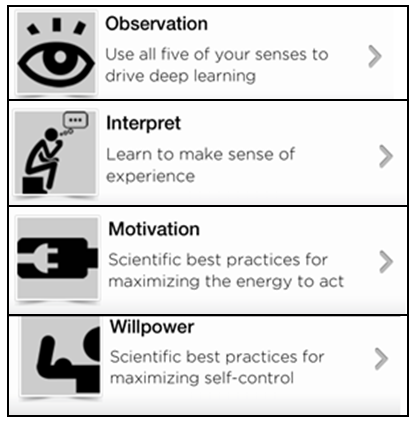Improve Problem Solving Under Pressure
 Interesting new research from Carnegie Mellon University demonstrates that chronically stressed individuals get better at problem solving if they take a few minutes to think about what is important to them. This self-affirmation technique can involve something as simple as taking a few minutes to identify an important value (family, art, business, friends. etc.) and writing a couple of sentences on what makes it important.
Interesting new research from Carnegie Mellon University demonstrates that chronically stressed individuals get better at problem solving if they take a few minutes to think about what is important to them. This self-affirmation technique can involve something as simple as taking a few minutes to identify an important value (family, art, business, friends. etc.) and writing a couple of sentences on what makes it important.
Focusing on what is important mitigates the effects of stress on parts of your brain and immediately improves your ability to solve problems. There is some evidence that this works outside the laboratory:
“An emerging set of published studies suggest that a brief self-affirmation activity at the beginning of a school term can boost academic grade-point averages in underperforming kids at the end of the semester.
A simple technique for improving cognitive performance under pressure in yourself and others. I am interested to hear from readers that have built self-affirmation into everyday activities.
Source of image: Pressure Cooker
Categories: College Student, Problem Solving Tags:
25 Proven Ways to Develop Willpower
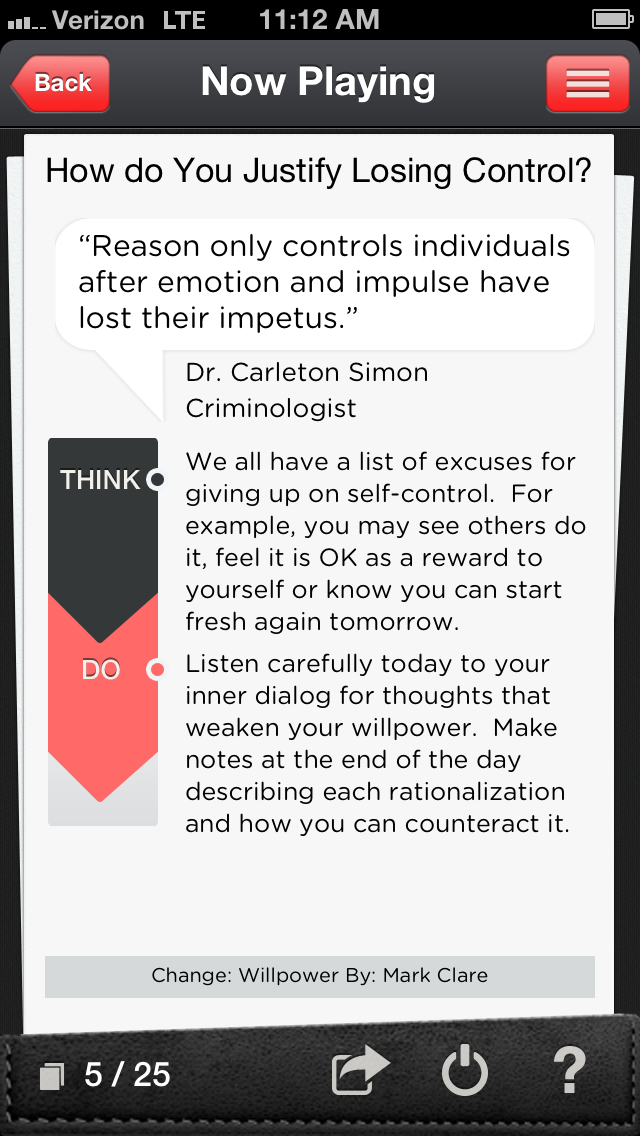 Willpower is the ability to carry out plans and reach goals especially when obstacles challenge us. It is what we use to resist temptation and keep going when we want to stop. Motivation, self-control, determination and grit all rolled up into our force of will.
Willpower is the ability to carry out plans and reach goals especially when obstacles challenge us. It is what we use to resist temptation and keep going when we want to stop. Motivation, self-control, determination and grit all rolled up into our force of will.
The topic of willpower is getting a lot of attention these days. A few examples:
- Akst, D. (2011). We Have Met the Enemy: Self-Control in an Age of Excess
- Baumeister, R. and Tierney, J. (2011). Willpower: Rediscovering the Greatest Human Strength
- McGongal, K. (2011). The Willpower Instinct: How Self-Control Works, Why It Matters, and What You Can Do To Get More of It
Some researchers argue that willpower is like a muscle. If we push too hard we become fatigued and can fail. On the other hand, if we train we can become very strong and develop endurance. But what techniques should we use to train?
To guide my training efforts I have reviewed the research and compiled 25 techniques that are practical enough to use in an everyday setting. To keep things simple I’ve documented each technique on a knowledge card that takes only a few minutes to use. Check out the example card to the right.
You can access the techniques in NewHabits a free iPhone and iPad app. Look in the store for the willpower deck. In the morning I quickly scan the deck and pick a card I want to play. With each play I strengthen my willpower muscle. It is easy to share the cards with friends through email, Facebook or Twitter.
Give the App and try and share your cards with others. I would like to hear from readers about how well the cards work and what other cards should be added.
Categories: Books, Cognitive Development, Mental Focus, Software, Training Tags:
More Evidence for Mind-Body Techniques
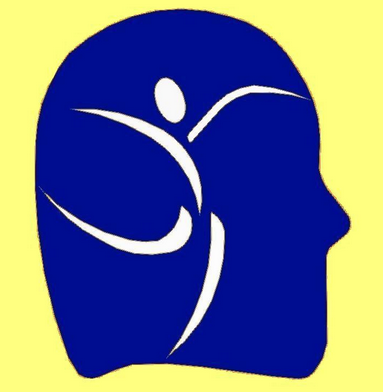 In the Next Brain Blog we look at evidence-based techniques for achieving peak mental performance at any age. What can we do to maintain brain health and improve cognitive performance?
In the Next Brain Blog we look at evidence-based techniques for achieving peak mental performance at any age. What can we do to maintain brain health and improve cognitive performance?
Several posts have focused on mind-body techniques. Such techniques ask us to focus on the connection between how we think and feel and various bodily functions and activities. Yoga, mindful breathing and mediation are examples. While such techniques are often viewed as fuzzy or new age, we have been documenting the growing evidence for how they improve brain function and cognitive performance on the Next Brain blog.
Additional evidence was recently published by the Boston University School of Medicine. They conduct a class with 27 medical students on Embodied Health: Mind-Body Approaches to Well-Being. It ran for 11 weeks and covered the neuroscience and methods for slow breathing, resistance breathing, Yoga, the placebo effect and mindful mediation practices. Students were asked to practice the methods at least three times per week.
Assessments before and after the course revealed a statistically significant improvement in the student’s capacity for self-regulation and self-compassion.
Self-regulation is our ability to manage our thoughts, feelings and impulses in order to achieve planned behaviors and goals. A capability that is essential for improvement, success and well-being in any walk of life.
For more information you can access the entire article for free. Be sure to check out table one that lists the topics and required readings for the course.
While the Boston work does not surface any new techniques it does add to the evidence for the effectiveness on the mind-body approach. The fact that doctors-to-be are learning about them in medical school signals a maturing and acceptance of the the approach.
How are you using mind-brain techniques to improve your cognitive performance?
Source of Image: Dr. Deb’s Psychological Perspectives
Categories: Ancient Ways, Executive Function, Manage Emotions, Training Tags:
Can We Get Better at Learning From Experience?
We learn most things from experience. Learning how to ride a bike, solve algebraic equations, cook a good meal, read a book or get along with a difficult neighbor are just a few examples. The learning from experience process is well understood. It is conceptually simple but error prone in practice.
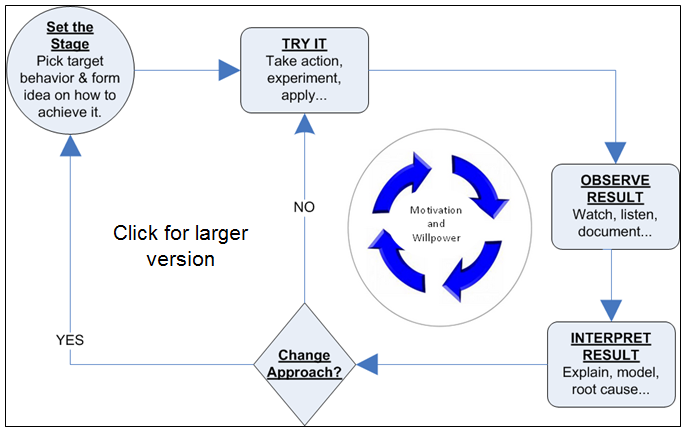 We set the stage by deciding what we are trying to learn and selecting a new behavior to try. We try the new behavior, observe the results, interpret the results and decide if we need to change our approach or stay the course. This process is repeated until we reach our goal or give up.
We set the stage by deciding what we are trying to learn and selecting a new behavior to try. We try the new behavior, observe the results, interpret the results and decide if we need to change our approach or stay the course. This process is repeated until we reach our goal or give up.
Of course it takes motivation to get this effort started and willpower to keep it going. Learning something new from experience takes diligence and usually involves some physical, emotional or reputational risks. Remember falling off your bike and the worry of reading poorly out loud as a grade school student?
Given the fundamental role learning from experience plays in acquiring new skills and changing behaviors, getting better at would have a significant impact on our overall cognitive performance. But can we really get better at it?
Fortunately, the answer is yes but we need to approach it one-step at a time. We should focus on improving our observation skills, interpretation skills or our capacity for self-control. Improvement in any one of these areas should translate into faster and deeper learning from experience.
You can use NewHabits, the free iPhone and iPad App to improve your ability to learn from experience. The App includes the following decks of knowledge cards:
Each deck includes 25 proven practices for getting better at one of the steps in learning from experience. You can play a card daily or every few days from your mobile device. Cards are designed to fit into your daily work or home routine and takes just  minutes to play. Each card is one small improvement step but the effects accumulate over time into significant new competencies and habits.
minutes to play. Each card is one small improvement step but the effects accumulate over time into significant new competencies and habits.
Download NewHabits and give some cards a try. Both the motivation and observation decks are free. The other decks are $0.99 or $1.99 but you get 3 sample cards for free.
Categories: Cognitive Development, Problem Solving, Software Tags: experiential learning
Boost Your Brain and Help Veterans
UPDATE: The contest ends on April 29th and they already passed the 30,000 start mark!
A reader sent me a note about a brain-a-thon Posit Science is running. You do brain training exercises and earn stars (points)  towards free subscriptions to BrainHQ for veterans with brain related inquiries. But you won’t be working alone. All your stars are added to those earned by others and if the total hits 10,000 Posit with donate 200 one-year subscriptions and if we hit 40,000 stars they will donate 500 subscriptions worth almost $50,000.
towards free subscriptions to BrainHQ for veterans with brain related inquiries. But you won’t be working alone. All your stars are added to those earned by others and if the total hits 10,000 Posit with donate 200 one-year subscriptions and if we hit 40,000 stars they will donate 500 subscriptions worth almost $50,000.
This is also a good way for you to try out some of the services for free. The brain training should help you focus attention, sharpen recall and process information faster. You get a brain boost and an opportunity to help veterans and their families. A good deal!
Categories: Memory and Learning, Mental Focus, Software Tags:
Train Your Creative Brain in Minutes a Day
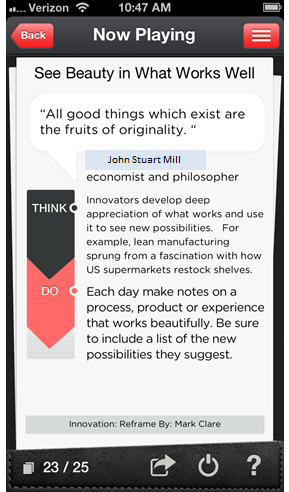 I recently completed a review of some of the best creativity techniques and innovation methods. My goal was to distill proven practices for improving creativity into a set of knowledge cards that could be used for brain training. Unlike most approaches to brain training, I did not want to create a game or some structured task to do on a computer. I wanted brain training “in the wild” or something that you can do along with your everyday activities and work efforts. That way you will see improvements in areas that matter. The result is a mobile brain training solution that runs on the iPhone, iPad and iPod touch:
I recently completed a review of some of the best creativity techniques and innovation methods. My goal was to distill proven practices for improving creativity into a set of knowledge cards that could be used for brain training. Unlike most approaches to brain training, I did not want to create a game or some structured task to do on a computer. I wanted brain training “in the wild” or something that you can do along with your everyday activities and work efforts. That way you will see improvements in areas that matter. The result is a mobile brain training solution that runs on the iPhone, iPad and iPod touch:
You can access the Reframe cards through NewHabits a free App that includes others decks on innovation and behavior change.
Play a card daily from your mobile device to experiment with and eventually master a proven creativity technique. Cards are designed to fit into everyday routines and take minutes to use. The Reframe cards work by converting general advice and complex how-to knowledge about creativity into right-sized chunks that are optimized for how we learn from experience.
The Reframe deck includes 25 cards. An example is shown to the right. Many of the cards assume you are working on a hard problem or innovation challenge that requires creativity. If you don’t have one pick a challenge from around the house – how to get the kids to do their homework or how to pick a wow gift for your spouse – and use that.
The deck includes a table of contents that makes it easy to manage and navigated the cards. You can share cards for free with friends via email, text messages, Twitter, Facebook and other means. For more information on how the App works check out the screen walk through.
Give the App a try and please comment on your experiences.
Categories: Problem Solving, Software, Training Tags:
The High Cost of Poor Brain Health
Dementia tops the cost of cancer or heart disease!
 In the Next Brain Blog we focus on evidence-based techniques that help you maintain or improve brain function and cognitive performance at all ages. Nature gave us a hind brain, mid brain and fore brain, and it is now up to us to use the latest science, technology and proven practices to create our Next Brain. Neglecting our brain fitness, especially as we age can lead to bad outcomes just as neglecting our physical health can. We increase the chance of age-related cognitive impairment, dementia and even Alzheimer’s disease.
In the Next Brain Blog we focus on evidence-based techniques that help you maintain or improve brain function and cognitive performance at all ages. Nature gave us a hind brain, mid brain and fore brain, and it is now up to us to use the latest science, technology and proven practices to create our Next Brain. Neglecting our brain fitness, especially as we age can lead to bad outcomes just as neglecting our physical health can. We increase the chance of age-related cognitive impairment, dementia and even Alzheimer’s disease.
A new study makes this point dramatically:
“The monetary cost of dementia in the United States ranges from $157 billion to $215 billion annually, making the disease more costly to the nation than either heart disease or cancer, according to a new RAND Corporation study. “
This makes poor brain health a big factor in the US healthcare crisis. More motivation for sticking with our next brain development efforts and encouraging others to do so too!
Source: Image
Categories: Cognitive Decline Tags:
20 Hours of Mobile Gaming Enhances Cognition
 A new study found that playing video games for an hour a day, five days per week, for a month produced significant improvements in a player’s ability to track multiple objects and complete visual search tasks. That is just 20 hours of using games that are a lot of fun.
A new study found that playing video games for an hour a day, five days per week, for a month produced significant improvements in a player’s ability to track multiple objects and complete visual search tasks. That is just 20 hours of using games that are a lot of fun.
Researchers looked at the effects of action games and non-action games. The games in the study included: Modern Combat Sandstorms. The Sims3, Bejeweled 2, Memory Matrix and Hidden Expedition Everest.
There are two important aspects of this study for readers of the Next Brain Blog:
- Gaming improves specific cognitive skills on small screens and works in the wild. Participants used their iPhones and did the training outside the laboratory in a real world setting.
- Non-action games, for example Sims3 and Memory Matrix showed some evidence of improving cognitive skills. While this is a preliminary result, it is important for those that don’t like violent games.
I am interested to hear how readers are using their mobile phones to play games or use other apps to improve brain function and cognitive performance.
Categories: College Student, Memory and Learning, Perception Tags: games
Champion Level Memorization Technique
 For 16 years there has been an annual contest to determine who in the USA has the best memory. There are seven events, including a poetry event, and 53 mental athletes registered to compete in 2013. The contest is taking place today!
For 16 years there has been an annual contest to determine who in the USA has the best memory. There are seven events, including a poetry event, and 53 mental athletes registered to compete in 2013. The contest is taking place today!
The BrainWorld blog has a good post about the 2012 champion who provides insights into his success. While none of the general advice will surprise readers of the Next Brain Blog (exercise, nutrition, social well-being and mental engagement), the specific technique for memorizing long lists of items is useful.
To use the technique you convert each item in the list into a picture that is meaningful and then place the pictures in order along a path or location that is familiar. For example, if memorizing a list of numbers you could translate each number into the jersey number of your favorite football player and then visualize each player in a specific room in your house. You can then recall the numbers by doing a mental walk through of your house and look at each player’s jersey.
I am interested to hear from readers that use specific memorization techniques.
Categories: Memory and Learning, Training Tags:
The Impact of Physical Activity on the Brain
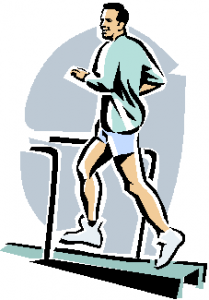 Here in the Next Brain Blog we have reviewed many studies that demonstrate the impact physical activity has on brain function and cognitive performance. For example:
Here in the Next Brain Blog we have reviewed many studies that demonstrate the impact physical activity has on brain function and cognitive performance. For example:
Instant Memory Boost from Six Minutes of Exercise
Tai Chi Boosts Brain Volume and Performance
Exercise Once Weekly Helps Avoid Mental Decline
Short Weekly Walks Improve Intelligence
to list a few. And if that is not enough to convince you to include physical activity as part of your brain training efforts, a review of multiple research studies presented at a recent meeting of the American Association for the Advancement of Science found:
“Dozens of studies now show that aerobic exercise can increase the size of critical brain structures and improve cognition in children and older adults.”
I am interested to hear from readers that use physical activity to improve brain function and cognitive performance. What activities do you do? How frequent do you do them?
Categories: Child, Cognitive Decline, Lifestyle, Memory and Learning, Older Adult Tags: exercise

